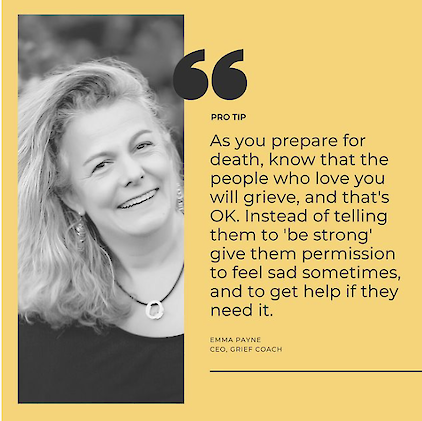How to include a grief plan in your end of life plan
When you think about planning for your death, what comes to mind? Funeral expenses? Estate planning? These important end-of-life considerations will help your loved ones manage the financial impact of your passing, but what about the emotional impact? Consider incorporating a grief plan into your end-of-life plan. You can provide your loved ones with peace of mind after your passing by anticipating grief responses, normalizing the grieving process, and identifying appropriate and available resources for support after the death of a loved one.
During the end-of-life planning phase, we can give grief permission to exist. Giving a voice to the grief that is present can create a sacred space where feelings and thoughts can be shared, absorbed, and in some cases released. For some people this means using their final months to engage in the “making” of memory, legacy, and meaning, so that grief can be acknowledged every step of the way.
Some ideas that many people find healing and helpful as they integrate grief into end-of-life planning are to:
- Think forward. What are important dates or milestones that will occur for your family and friends? Consider writing a note or pre-arranging flowers to be delivered so that your presence is felt during big life moments. Examples: a child graduating from high school, receiving a congratulations card, in your handwriting, with a few words of inspiration. Or a spouse, receiving flowers on their first wedding anniversary as a bereaved widow/widower with a note on how to still love you while also giving permission for them to move forward.

- Think backward. Consider having your life’s story recorded. Leaving bits of your life’s story so that future generations can know you and learn from your wisdom can be an incredible gift to mourners. Programs like StoryCorps or Lastly.com help guide you through the process of telling your life’s story. You may also enlist in your family and friends to help capture your life’s story.
- Think present. For some, this is the time to mend and nurture the relationships around you. In Dr. Ira Byock’s book, The Four Things that Matter Most, he explains that four simple phrases “Please forgive me,” “I forgive you,” “Thank you,” and “I love you” have enormous power to resolve interpersonal disconnections and/or strengthen existing connections. Reflect on who in your life may benefit from having a conversation that includes one of these phrases.
- Think and plan for the long haul of grief. Consider gifting a few Grief Coach subscriptions to family or friends so that they can receive expert, thoughtful, personalized grief support via text message, all year long.
- Think about practical ways to support your loved ones. This could look like purchasing prepared meal deliveries, arranging a maid service for a few months, or even pre-paying for some therapy sessions that can be rendered at any time.
- Think about grief resources that your loved ones can access. Finding local and online grief counseling books, groups, camps, and conferences can encourage them to seek out additional support during their grief experience.
The end-of-life planning process is, just that, a process. It requires time, thoughtfulness, attention, and support. We hope these suggestions can be a starting point to help guide your own personal reflections on what attuning to grief looks like for you and the ones you care about.
Co-authored by Melissa Lunardini, MA, MBA, FT, Director of Community Operations for Grief Coach & Cindy N., PhD, LICSW, Founder, Sagebrush Crossing, SPC